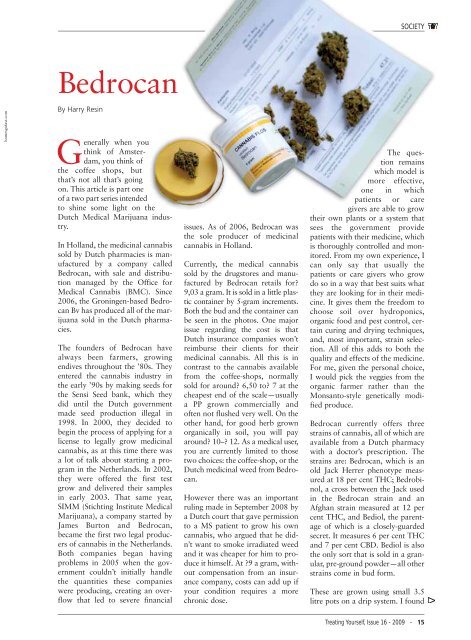Create successful ePaper yourself
Turn your PDF publications into a flip-book with our unique Google optimized e-Paper software.
homesgofast.com<br />
Bedrocan<br />
By Harry Resin<br />
Generally when you<br />
think of Amsterdam,<br />
you think of<br />
the coffee shops, but<br />
that’s not all that’s going<br />
on. This article is part one<br />
of a two part series intended<br />
to shine some light on the<br />
Dutch Medical Marijuana industry.<br />
In Holland, the medicinal cannabis<br />
sold by Dutch pharmacies is manufactured<br />
by a company called<br />
Bedrocan, with sale and distribution<br />
managed by the Office for<br />
Medical Cannabis (BMC). Since<br />
2006, the Groningen-based Bedrocan<br />
Bv has produced all of the marijuana<br />
sold in the Dutch pharmacies.<br />
The founders of Bedrocan have<br />
always been farmers, growing<br />
endives throughout the ’80s. They<br />
entered the cannabis industry in<br />
the early ’90s by making seeds for<br />
the Sensi Seed bank, which they<br />
did until the Dutch government<br />
made seed production illegal in<br />
1998. In 2000, they decided to<br />
begin the process of applying for a<br />
license to legally grow medicinal<br />
cannabis, as at this time there was<br />
a lot of talk about starting a program<br />
in the Netherlands. In 2002,<br />
they were offered the first test<br />
grow and delivered their samples<br />
in early 2003. That same year,<br />
SIMM (Stichting Institute Medical<br />
Marijuana), a company started by<br />
James Burton and Bedrocan,<br />
became the first two legal producers<br />
of cannabis in the Netherlands.<br />
Both companies began having<br />
problems in 2005 when the government<br />
couldn’t initially handle<br />
the quantities these companies<br />
were producing, creating an overflow<br />
that led to severe financial<br />
issues. As of 2006, Bedrocan was<br />
the sole producer of medicinal<br />
cannabis in Holland.<br />
Currently, the medical cannabis<br />
sold by the drugstores and manufactured<br />
by Bedrocan retails for?<br />
9,03 a gram. It is sold in a little plastic<br />
container by 5-gram increments.<br />
Both the bud and the container can<br />
be seen in the photos. One major<br />
issue regarding the cost is that<br />
Dutch insurance companies won’t<br />
reimburse their clients for their<br />
medicinal cannabis. All this is in<br />
contrast to the cannabis available<br />
from the coffee-shops, normally<br />
sold for around? 6,50 to? 7 at the<br />
cheapest end of the scale—usually<br />
a PP grown commercially and<br />
often not flushed very well. On the<br />
other hand, for good herb grown<br />
organically in soil, you will pay<br />
around? 10–? 12. As a medical user,<br />
you are currently limited to those<br />
two choices: the coffee-shop, or the<br />
Dutch medicinal weed from Bedrocan.<br />
However there was an important<br />
ruling made in September 2008 by<br />
a Dutch court that gave permission<br />
to a MS patient to grow his own<br />
cannabis, who argued that he didn’t<br />
want to smoke irradiated weed<br />
and it was cheaper for him to produce<br />
it himself. At ?9 a gram, without<br />
compensation from an insurance<br />
company, costs can add up if<br />
your condition requires a more<br />
chronic dose.<br />
SOCIETY<br />
The question<br />
remains<br />
which model is<br />
more effective,<br />
one in which<br />
patients or care<br />
givers are able to grow<br />
their own plants or a system that<br />
sees the government provide<br />
patients with their medicine, which<br />
is thoroughly controlled and monitored.<br />
From my own experience, I<br />
can only say that usually the<br />
patients or care givers who grow<br />
do so in a way that best suits what<br />
they are looking for in their medicine.<br />
It gives them the freedom to<br />
choose soil over hydroponics,<br />
organic food and pest control, certain<br />
curing and drying techniques,<br />
and, most important, strain selection.<br />
All of this adds to both the<br />
quality and effects of the medicine.<br />
For me, given the personal choice,<br />
I would pick the veggies from the<br />
organic farmer rather than the<br />
Monsanto-style genetically modified<br />
produce.<br />
Bedrocan currently offers three<br />
strains of cannabis, all of which are<br />
available from a Dutch pharmacy<br />
with a doctor’s prescription. The<br />
strains are: Bedrocan, which is an<br />
old Jack Herrer phenotype measured<br />
at 18 per cent THC; Bedrobinol,<br />
a cross between the Jack used<br />
in the Bedrocan strain and an<br />
Afghan strain measured at 12 per<br />
cent THC, and Bediol, the parentage<br />
of which is a closely-guarded<br />
secret. It measures 6 per cent THC<br />
and 7 per cent CBD. Bediol is also<br />
the only sort that is sold in a granular,<br />
pre-ground powder—all other<br />
strains come in bud form.<br />
These are grown using small 3.5<br />
litre pots on a drip system. I found<br />
<strong>Treating</strong> <strong>Yourself</strong>, <strong>Issue</strong> 16 - 2009 - 15



